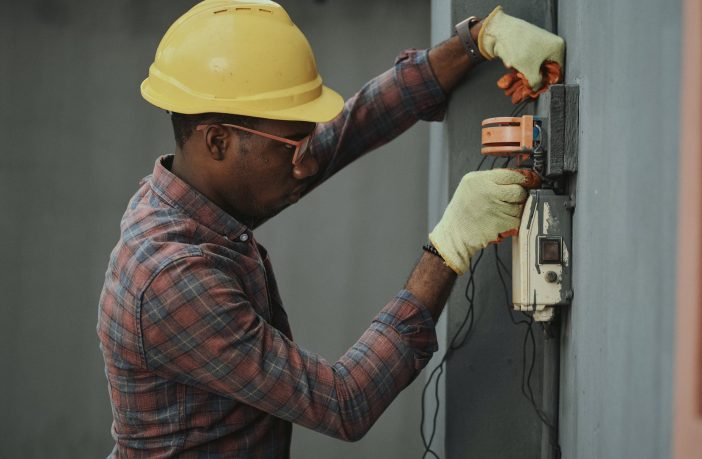- The Energy Performance Certificate (EPC) Practitioner Skills Programme is a demand-oriented, dual-structured short course for Energy Performance Certificates for Buildings, to qualify young electricians for income-generating employment.
- This is a programme of the South African National Energy Development Institute (SANEDI), championed by SANEDI’s General Manager Barry Bredenkamp, in partnership with the Institute of Energy Professionals Africa (IEPA).
The EPC Regulation, published in December 2019, requires the mandatory display of EPCs by December 2022. Read more
The timely launch of the EPC Practitioner Skills Programme is highlighted by Teslim Yusuf, SANEDI Project Manager, Data and Knowledge Management and Smart Grids for the project, “As one of the implementing agencies of the DMRE, we are mandated to implement the Regulations on the Mandatory Display and Submission of Energy Performance Certificates for Buildings, the EPC Practitioner Skills Programme enables such implementation. Through this skills programme fifty (50) unemployed electricians will be upskilled with relevant and useful competencies and knowledge thereby also helping to address the high unemployment rate of youth in South Africa as well.”
The unemployed electricians will embark on a journey together with their lecturers and workplace mentors to develop competencies in the EPC Regulation, and related standards. In partnership with the respondent colleges, Ekurhuleni East TVET College (EEC) and College of Cape Town (CCT), the programme will include online and in-person training with a practical and work experience component to complete their assignment to fulfil the qualification’s requirements.
The EPC Regulation requires buildings that fall into the category’s dominant occupancy for offices, places of instruction (i.e., schools, universities, etc), theatrical and indoor sports, and entertainment and public assembly. Public buildings owned, operated, or occupied by an organ of state with a net floor area of over 1, 000 square metre must comply. So too, privately owned buildings that are not owned, operated, or occupied by an organ of state with a net floor area of over 2,000 square metre fall into the requirements of the Regulation.
Non-compliance is in contravention of the National Energy Act of South Africa and may result in accounting officers in the case of public buildings, and building owners for private buildings, facing penalties of up to R5 million and may be accompanied by a jail sentence or both. This requirement is by no means new. The South African National Standard SANS1544:2014 for Energy Performance Certificates for Buildings has been in circulation for 8 years already.
The EPC Practitioners Skills Programme is a pilot programme that should contribute greatly to provide opportunities for the youth to enter the market of assisting accounting officers of public buildings, and building owners in the private sector, gather the necessary EPC technical information and documentation requirements for building assessment and inspection. EPC Practitioners are not qualified to issue EPCs but can support the EPC Inspection Bodies accredited by the South African National Accreditation System (SANAS) in achieving the Government target set for compliance.
Yusuf concludes, “This skills programme shows cohesion between the two national departments, DMRE and the DHET. We are looking forward to seeing this programme through as one of the representatives of its steering committee.”
For more information on this programme, you may visit the IEPA website: www.iepa.org.za/epc-practitioner/alternatively contact assessments@iepa.org.za
Author: Bryan Groenendaal
The programme is supported by the Department of Minerals Resources and Energy (DMRE), Energy Water Sector Education and Training Authority (EWSETA), GIZ Skills Development for a Green Economy ll (SD4GE II) programme, a German Technical Cooperation Programme implemented on behalf of the German Federal Ministry for Economic Cooperation and Development (BMZ) and the Department of Higher Education and Training (DHET).
The project is governed by a steering committee, and the EPC Practitioner Skills Programme is supported by representatives from SANEDI, DMRE, DHET, GIZ, BMZ, IEPA, Green Building Council of South Africa (GBCSA), South African Bureau of Standards (SABS), Electrical Contractors Association of South Africa (ECASA), Energy Services Companies Association of South Africa (EASA), Black Energy Professionals Association (BEPA), South African Energy Efficiency Confederation (SAEEC), National Cleaner Production Centre of South Africa (NCPC-SA), South African PhotoVoltaic Industry Association (SAPVIA), and EWSETA, as well as the two colleges EEC in Gauteng and CCT in Cape Town.


















1 Comment
Qualified as an electrician 2021. Unemployed and jobs need experience.